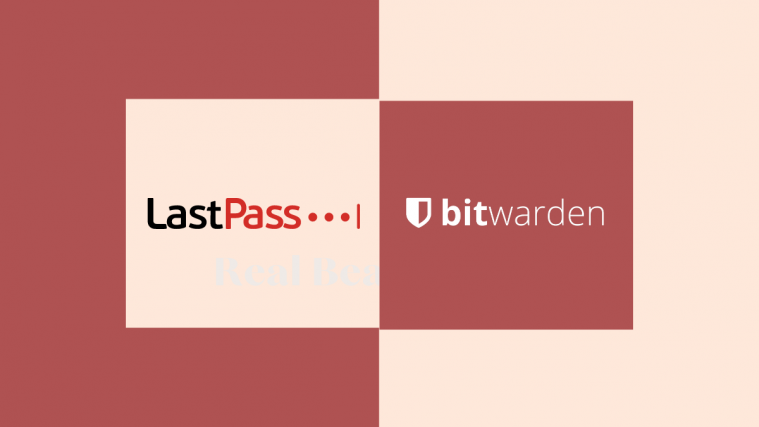If you are on the internet then you probably have a plethora of passwords for different services. Gone are the days when you could keep the same password for almost every account. Hackers have become a prevalent threat and security breaches now happen every day.
Hence, many people choose to use password managers to keep all their passwords complex, encrypted, and easy to access in one place.
LastPass and Bitwarden are some of the most popular password managers out there and each comes with its own set of features. If you have been confused between the two then let’s take a look at their prominent differences and what sets them apart from each other.
Related: How to Export Lastpass Passwords Safely
LastPass Free

LastPass is one of the oldest and long-standing password managers on the market. It has dedicated clients for all platforms and uses a master password that will help you access all of your passwords with a single click.
LastPass can also create complex new passwords for you and can even help you identify and change insecure passwords. LastPass will also verify your encrypted passwords against a compromised database of passwords to let you know if you should change one of your passwords immediately.
Let’s take a look at some of the most prominent features of the free version of LastPass that you can benefit from.
- Limited to a single user
- Secure Password Vault
- Password generator
- LastPass authenticator
- Address and payment details Auto-fill
- Access to LastPass Wallet to store memberships, cards, insurance cards, and more.
- Password Sharing ability
- Data Breach notifications
- Zero-Knowledge business model
- AES – 256 and SHA – 256 Ciphers
- Multifactor authentication support (does not include advanced support or support for biometric authentication)
- Ability to store passwords on your local storage
- Username generator
- But, access from either mobile or PC
Bitwarden Free

Bitwarden is the new password manager in town that has an open-source design that allows anyone with the particular set of skills to check and recompile Bitwarden code at their own convenience.
Just like LastPass, Bitwarden stores all your passwords in one place and allows you to source them whenever you like. They share the same encryption standards but Bitwarden offers some exclusive perks to free users that help it stand out from the crowd.
Bitwarden also has a password strength tester that can help you identify and change insecure passwords easily. Let’s take a look at all the perks offered by the free plan of Bitwarden.
- Access to either mobile or PC
- Limited to a single user
- Access to all Bitwarden apps on all platforms
- Unlimited password and wallet storage
- Free syncing across all devices
- Secure password generator
- Encrypted password export support
- 2-Factor Authentication Support
- Cloud hosting access
- AES – 256 and SHA – 256 Ciphers
- Salted Hashing support
- Compliant with Privacy Shield, GDPR, and CCPA standards
LastPass free vs Bitwarden free
While both services offer similar features when it comes to the free plan, each has its own perks and unique features. Let’s take a look at the exclusive features offered by LastPass and Bitwarden for their free plans.
| # | LastPass Features | Bitwarden Features |
| 1 | Easy to import passwords | Difficult to import passwords |
| 2 | Easy auto-fill process | Auto-fill requires a few additional manual inputs |
| 3 | Password generator supports passwords up to 99 characters | Password generator supports up to 128 characters |
| 4 | Custom fields can not be added to data stored in Wallet | Custom fields can be added to data stored in Wallet |
| 5 | Passwords can be shared with multiple users | Passwords can only be shared with a single recipient |
| 6 | No Encrypted cloud storage for free users | 1GB Encrypted cloud storage for free users |
| 7 | Closed Source, No Knowledge business model | Open Source design |
| 8 | Can not be self-hosted | Can be self-hosted by upgrading to a premium plan |
| 9 | Emergency Access | No dedicated emergency access (will need to use standard recovery options) |
| 10 | No biometric login support in the free plan | Biometric Login support in the free plan |
Now that we’ve looked at the differences, let’s take a look at the common features that are offered by both the services under their free plans.
- Unlimited Password Storage
- Multi-device sync support
- One to one password sharing
- TOTP 2FA support
As with any other digital service, LastPass and Bitwarde offer you a premium option with bonuses and features. Depending on your usage, these premium plans might be more beneficial to you especially if you are looking to use them for your organization. Let’s take a look at all the perks offered by each premium plan.
Note: We will be comparing the Personal and Business Premium plans with the highest pricing. There are other plans offered by these services that are cheaper but cut down on some features to save cost.
| # | LastPass | Bitwarden |
| 1 | 6 Maximum Users | 6 Maximum users |
| 2 | Unlimited password storage | Unlimited Collections |
| 3 | Access to LastPass on all platforms | Access to Bitwarden on all platforms |
| 4 | Unlimited Wallet Storage | Unlimited password and wallet storage |
| 5 | One to one and one to many sharing support | Unlimited shared items |
| 6 | Encrypted cloud storage (1GB Personal use) | Encrypted cloud storage (1GB Personal + 1GB Business) |
| 7 | Encrypted Export | Encrypted Export |
| 8 | MFA, Advanced MFA, and LastPass authenticator support | 2FA, Yubikey, U2F, and Duo support |
| 9 | Health reports, dark web monitoring, and secure notes and reports. | Vault Health Reports |
| 10 | Emergency Access support | Emergency Access support |
| 11 | Self-guided and email support | Priority Support |
| 12 | Only Cloud hosting support | Cloud hosting and self-hosting support |
| Price | $48/Year (if billed annually) | $40/Year (if billed annually) |
Note: As with personal premium plans, we will be comparing the highest offerings for businesses when it comes to premium plans. There are cheaper plans offered by both these services that cut down on some features to reduce the cost of the particular premium plan.
| # | LastPass | Bitwarden |
| 1 | Unlimited Users | Unlimited users and collections |
| 2 | Access to LastPass across all platforms | Access to Bitwarden across all platforms |
| 3 | Unlimited Password and Wallet Storage | Unlimited Password and Wallet storage |
| 4 | Support for unlimited multi-device sync | Support for unlimited multi-device sync |
| 5 | One to one sharing, One to many sharing, and shared folders support | Unlimited Shared items |
| 6 | Secure password generator | Secure Password generator |
| 7 | N/A | Encrypted file attachment support 1GB Personal + 1GB Org (For each user) |
| 8 | 2FA, Biometric authentication, Contextual authentication, Workstation login, and authentication reporting support. | Bitwarden TOTP authenticator, 2FA, Yubikey, U2F, and Duo support |
| 9 | Emergency Access support | Personal Emergency access |
| 10 | Access to authentication reports, dark web monitoring, security dashboard, Admin console, and SSO login reports. | Access to Vault health reports and audit logs. |
| 11 | Support for Offline mode | Support for User Groups |
| 12 | Support for API sync, Directory Sync, and Federated logins. | Support for API Access and Directory Sync |
| 13 | SSO support for 1200+ integrated applications, contextual access policies, dedicated SSO portal for members, and detailed reports. | Support for SSO login |
| 14 | Supports admin console but no custom management roles. | Support for Enterprise policies as well as custom management roles |
| 15 | Self-guided support and dedicated Customer Success Manager. | Priority Support |
| 16 | No Self-hosting support, only cloud hosting | Support for Cloud and Self-hosting |
| 17 | Security Dashboard support | Security Dashboard support |
| Price | $96/year for each user (if billed annually) | $60/year for each user (if billed annually) |
Verdict
Now that you are familiar with the differences and similarities between the two services you might have realized that finding the best one depends mostly on your needs. We have included our recommendations based on these factors below.
Keep in mind that LastPass recently had a massive data breach and a lot of information was compromised. Though none of the user passwords were leaked thanks to their no knowledge business model, this is still a glaring circumstance that we have to take into account.
For security (personal use)
We recommend Bitwarden for maximum security if you wish to use the service personally. It offers more features whether you are using the free or paid plan when compared to LastPass and gives you support for TOTP and 2FA without having to subscribe to a premium business model.
Additionally, you also get the ability to self-host Bitwarden which can help ensure maximum security for personal use. Bitwarden will also help you generate longer and more complex passwords compared to LastPass which supports up to 99 characters while Bitwarden supports up to 128 characters.
Recommendation: Bitwarden
For security (business use)
We recommend LastPass for maximum security when it comes to businesses as you get access to unseen features which include contextual security protocols, customizable security policies, a variety of support for SSO logins with detailed reports, and syncing across most devices.
LastPass will also provide you with detailed reports for your admin console, SSO logins, and MFA authentications so that you can keep up to date with the use of LastPass within your organization.
Another perk is the dedicated Customer success manager that will help solve most if not all your problems on a priority basis which can help you save valuable organization time that would otherwise be spent troubleshooting.
Recommendation: LastPass
For ease of use
If ease of use is your priority then we recommend LastPass. It is a tried and tested service with one-click support for auto-filling and auto-generating your passwords.
Sharing encrypted passwords is also very easy in LastPass when compared to Bitwarden and their autofill functionality works well on most websites and apps. Bitwarden on the other hand requires a few additional manual inputs to auto-fill your password which hampers its ease of usage.
LastPass has a more user-friendly UI with detailed annotations and tutorials which will make it much easier for new users to adapt to a password manager.
Recommendation: LastPass
Final pick!
Despite LastPass being our recommendation in two categories, our overall recommendation will be Bitwarden for the sheer multitude of features offered by the service under its free plan. It offers more bang for your buck while keeping its premium prices significantly lower when compared to LastPass.
The open-source business model and regular audits from security authorities make it quite a secure service for first-time users as well. While Bitwarden has a learning curve, it is by no means steep and can be easily overcome if you decide to spend some time with it.
Additionally, the ability to self-host your password manager is a much welcome addition that can come in handy if you are worried about your privacy.
Overall: Bitwarden
We hope this post helped you easily differentiate between LastPass and Bitwarden. Which service did you decide to use? Share your thoughts with us in the comments below.






